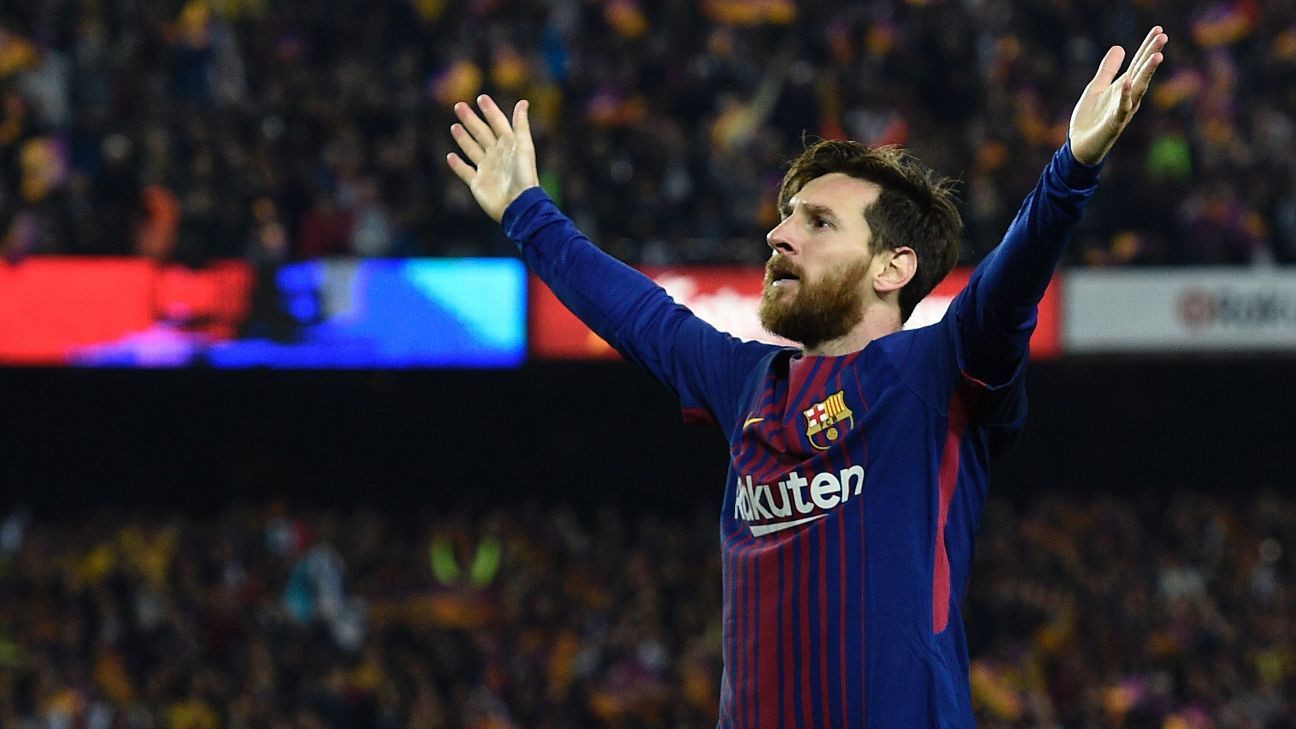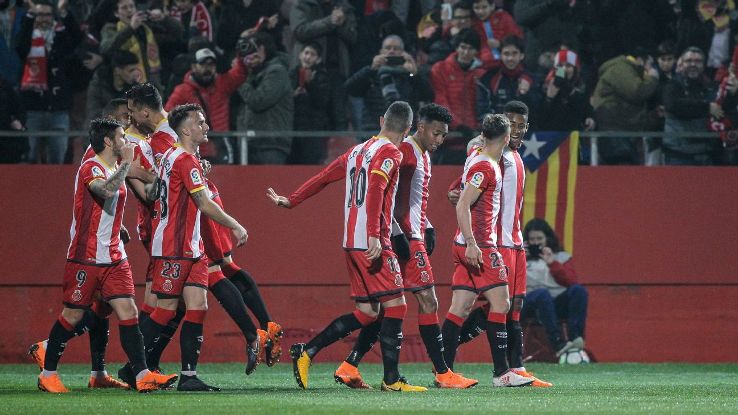

Barcelona aren’t only champions on merit but their title will mean a great deal when they assimilate that, rather than it being won with outrageous talent, via an established philosophy or several great footballers in their prime, this was a victory for Ernesto Valverde’s ability to figure out solutions.
In his first season with the club, he needed daring to invoke the idea of a four-, five- and six-man midfield so that his team could control the ball and space and hold many opponents by the throat. This, after all, is the club where, until recently, it was anathema to have more than three men in the centre of the pitch, albeit that they were Xavi Hernandez, Sergio Busquets and Andres Iniesta.
But Valverde’s understanding of how the Busquets-Ivan Rakitic axis could be powerful, that Paulinho “got” Lionel Messi’s movement and that Neymar leaving would be great for Jordi Alba, as well as his — risky — willingness to trust Luis Suarez when the striker begged not to be pushed toward keyhole surgery on a damaged meniscus; all of these were terrific first-season bets that paid off.
Above all, he recruited and convinced Messi — vital, but no easy task .
Did Madrid get an assist on the title? Yes. The first half of their season was impoverished, full of defeats and draws in which los Blancos were walking while their opponents ran.
Previewing the season, I warned that Madrid would struggle to cope with losing the goals of Alvaro Morata and James Rodriguez and so it proved. Between Zinedine Zidane and Florentino Perez — with the emphasis on the manager who had final say — the lack of fresh, top-class recruits for a squad that was temporarily both tired and sated having won repeatedly, was a mistake.
Elsewhere, Atletico’s transfer ban, and its impact upon when Diego Costa could be ready to impact, harpooned them, no matter how dogged their pursuit of the champions proved to be.
Valencia added verve and fire, but composing a squad based on loans and “revitalised” players during the last few days of the summer’s market did not add the depth, particularly to a club still in heavy debt, for a true title chase. But Marcelino’s performance in transforming the group into one that is fun to watch and which, with careful augmenting, can do well domestically and in Europe next season, was five-star.
Honourable mentions for “we-know-our-way-around” Girona, “we’re-coming-to-get-you” Levante, “we-weren’t-dead-only-out-at-the-pub” Alaves, as well as Diego Simeone, who won his sixth trophy in six-and-a-half years.
Best player: Lionel Messi
It would be perverse not to state the obvious. If you think it’s more fresh to seek out a newer name or encouraging to push forward an alternative case for, say, Jan Oblak, Goncalo Guedes, Rodrigo, Marc-Andre ter Stegen or Luka Modric, then get your eyes tested.
That crop of glorious footballers, if you gave them a voice in this poll, would vote for Messi. In fact, as much as those guys and a handful of others had stellar seasons, the Barcelona star only really had competition from one guy and he was wearing the same-coloured strip.
This has been Ivan Rakitic’s excelsior year in Spanish football. Utterly dependable, intelligent, indescribably hard-working and, only just behind the great man, Barcelona’s best player by a distance.
But Messi is something else. If you’re not convinced simply by him outscoring everyone, then well done, but he’s a runaway winner of this category for so much more. Once again it would be hard to decipher whether he’s a centre-forward, winger, No. 10 or midfielder.
He’s Messi.
One small, shattering, and ultimately damaging cameo tells the entire story. Barcelona were at Sevilla and, with the Champions League quarterfinal second leg in Rome just around the corner, Messi was rested.
Barcelona fell two goals behind and were chasing shadows, looking like conceding another every time Sevilla countered. Messi came on and the match ended 2-2, thanks to a pair of goals just before the final whistle, his entire team bucks up.
Every single Barca player, upon seeing Messi enter the pitch, suddenly believed, doubled their effort and tripled their confidence. He’s that good and that is why he is player of the season. By light years.
Most disappointing player: Andre Gomes
With mentions for Nolito, Bojan Krkic, Inigo Martinez, Bruno Soriano, Jesus Vallejo and Borja Mayoral, there is, sadly, only one player who dominates this category. And I’m disappointed for him, rather than in him.
Andre Gomes is a talented footballer. He’s also intelligent, a good professional, dedicated and … completely out of his depth at Barcelona.
However you may wish to characterise his admission of fear and devastating self-criticism, every time this European Championship-winning Portuguese international midfielder got his chance, I was willing him to get things right, to conquer his demons. and to prove that talking in public about these kinds of mental gremlins, with which many footballers wrestle, can be positive and curative.
It didn’t happen, though, which is truly disappointing.
Biggest surprise: Girona
Part of the joy of La Liga — this season at least — is that it was full of surprises!
Should Eibar be finishing so high in the table and as kings of the Basque country? You know the answer is no.
Did Leganes have any right, given their budget and experience, to not only come within a hair’s breadth of the Copa del Rey final but to seal another season in the top division with such comfort? No again.
The list goes on. Was, for example, the biggest surprise the good football that Levante played after Paco Lopez took over? Or was Abelardo’s rescue mission at Alaves the bigger jaw-dropper?

But the winner is — obviously — Girona.
Yes, they were well coached and, yes, they had their link-up with Manchester City. But to beat Real Madrid, draw with Atletico and produce six straight home wins with a 15-0 aggregate and finish with the highest points total of any promoted club in La Liga history? That has to be the biggest surprise of the season. Right?
Best goal: Pablo Fornals vs. Real Madrid
As usual, we’ve been blessed with a plethora of great goals, partly because the general technical level of players in Spain is superbly high, which leads to footballers who take chances on passes, crosses and shots that are utterly spectacular.
Messi’s eruption of free kick goals just after midseason, a surge of sensational conversions that not only helped Barca’s title push but sealed La Liga’s destination when he cracked a ball past Atletico’s Jan Oblak from outside the box, were treasures.
But I have a favourite and I urge you watch it again. It was mid-January, the exact halfway point of the campaign and Madrid had stretched Villarreal keeper Sergio Asenjo this way and that. The visitors to the Bernabeu had never beaten Madrid in Spain’s capital.
It’s the 87th minute and Madrid have won a corner. The time-honoured thing would be for Toni Kroos to centre and Cristiano Ronaldo or one of his mates to head home yet another “in extremis” Madrid win. Instead the ball breaks from a melee on the penalty spot and Denis Cheryshev has the daring to think of mounting a counterattack. From inside his own box with three minutes left.
He stoops low and deftly cushions a header into the path of Pablo Fornals who, from inside his own penalty box and with what feels like dozens of white shirts waiting to pounce and punish, controls and slides a ball inside to Manu Trigueros. The midfielder strides out of immediate danger with one accomplished touch.
Trigueros looks up, spots that Cheryshev has taken off like Usain Bolt down the left, and plays a perfect left-footed pass. Villarreal’s winger and Dani Carvajal are now in a heads-back, arms-pumping foot race. When Enes Unal makes a perfect supporting sprint, Cheryshev — hallelujah — not only spots him but arcs a lovely ball into his path.
Out sprints Keylor Navas and Unal doesn’t have the composure to finish. However, the ball rebounds to Fornals, who has outworked Raphael Varane and is in space to float an effortless left-foot chip that — gently but precisely — lofts over the leaping, clawing Navas and into the net.
Unparalleled ambition, technique, athleticism and such a wonderful reward.
Best game: Levante 5-4 Barcelona
Not simply because a little one took down a big one, nor because this was the match that signified that Barca wouldn’t become the first team to go a 38-match Liga season unbeaten.
Paco Lopez took a look at the opposition starting lineup and dictated the perfect tactics: front foot, swift counterattacks, punching through the middle where Yerry Mina was notoriously cumbersome. And, once Barcelona became stretched in midfield, piling men forwards to make clinical passes.
More, Levante did what so few sides manage domestically against Barcelona. Often the champions are caught on the turn, countered against, but rarely does the finish match the buildup. This time it did. Over and over again.
To make the 90 minutes greater, Ernesto Valverde’s side fought like tigers, having started the night like pussycats.
Although it was Emmanuel Boateng who took the plaudits — and why not, with a hat trick — Enis Bhardi’s goal was absolutely majestic.
Prediction for next season
That energy and stamina will be at a premium.
I’m stopping just short of stating that Atletico or Valencia have an outside chance of winning the title. But there’s no escaping the fact that with great swathes of Madrid and Barcelona’s squads being caught up in the World Cup’s latter stages, and with the offseason break being too short for many of the already-exhausted stars, there are going to be chances for well-constructed squads with well-rested players to out-punch the big boys.
Atleti will be obsessed with reaching the Champions League final in their own stadium, Valencia have the distraction of playing European football instead of resting midweek. So very much now rests on which club does the shrewdest, most effective transfer market business between now and late August.
Must do better
A part of La Liga’s history is that only three teams have never been relegated: Madrid, Barcelona and Athletic.
But the San Mames club were pitiful these past few months, short of goals, lacking confidence and, most worryingly, underperforming in the few areas where they do possess patent ability.
Most shocking of all is the fact that they were the fourth-worst home side. That San Mames stadium should be a fortress, it once was: hostile and uncomfortable for visitors of whatever stature.
Now this squad, and departing coach Cuco Ziganda, have stripped the passionate home fans of belief. That’s very corrosive.
At Sevilla, there is a Monchi-size hole where their rebuild should already be at full tilt.
There’s board-level strife, a coach who doesn’t know whether he’ll stay in that role, take over as director of football or leave the club. New players would normally be lined up by now, but Monchi’s replacement, Oscar Arias, has been shown the door.
Must do better? Must do a hell of a lot better, these two clubs.
One wish
There’s a clutch of relatively young players emerging right now into a climate where, largely, they are trusted and given the chance to prove themselves.
I’m thinking of Fornals, Rodri, Samu Castillejo, Carlos Soler, Toni Lato, Ferran Torres, Fabian Ruiz, Loren Moron, Junior Firpo, Carles Alena, Igor Zubeldia, Alvaro Odriozola, Mikel Oyarzabal, Jesus Vallejo and Lucas Hernandez to name just a few of them.
My fervent wish would be that their progress continues unabated, that the culture of cantera players doesn’t lose momentum in Spain and that others, like Borja and Dani Ceballos, get themselves back on track.
Graham Hunter covers Spain for ESPN FC and Sky Sports. Author of “Barca: The Making of the Greatest Team in the World.” Twitter: @BumperGraham.

Be the first to comment